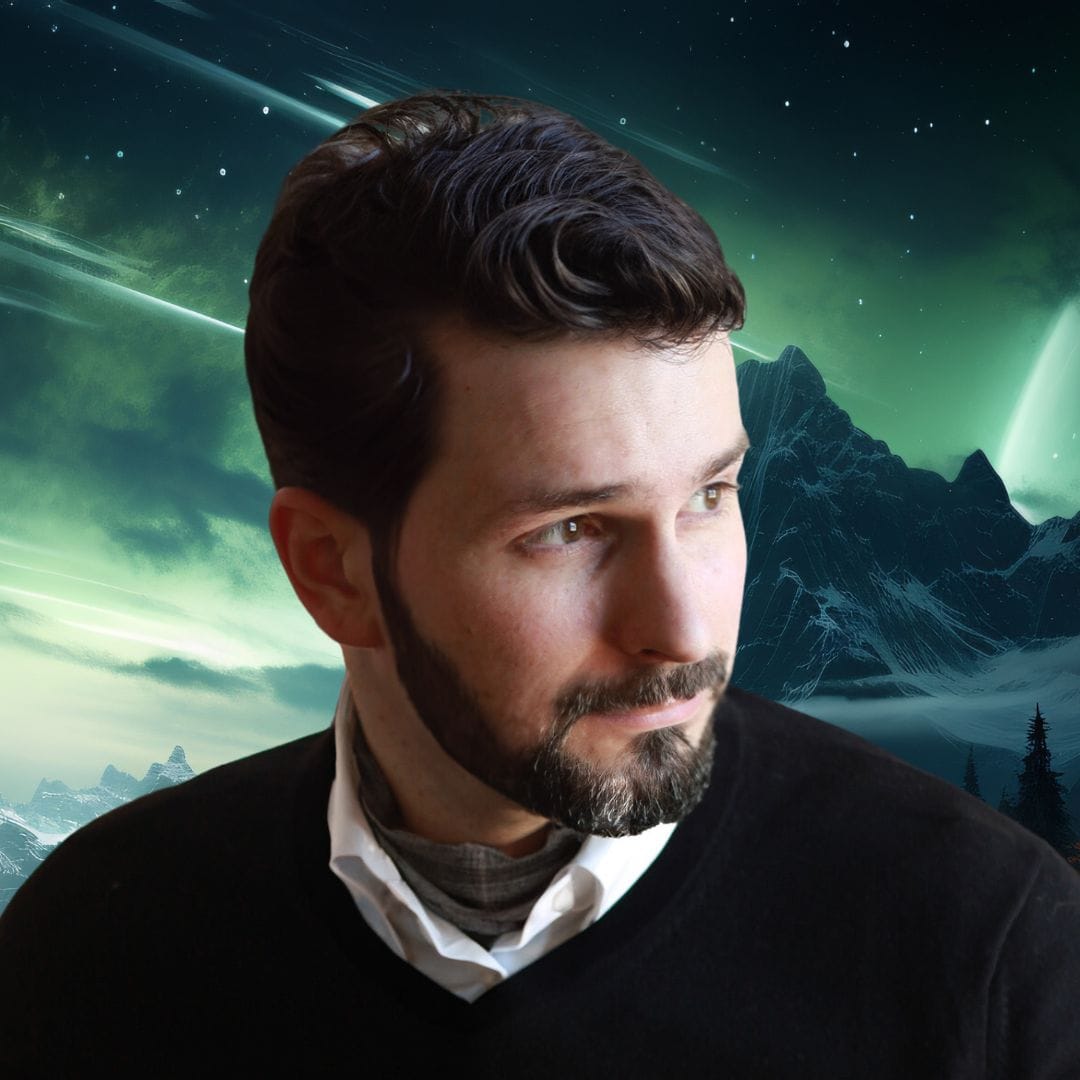Early into our new LegendFiction community, a couple of members asked for a space to share work on horror. As we set it up, we had some good conversations. Some Christians are pretty averse to anything ‘horror,’ fearing some sort of contagion from evil. But… that’s not how evil works. And Scripture is pretty adamant that we ‘fear not.’
So how can Christians approach this topic? Since we aren’t into moral book burning at LegendFiction, we try to think deeper and see what goodness we can glean from things.
This is a great convo from a show I love to follow, the Regeneration podcast, probably better to learn from them than me!
Here are my own thoughts on this topic.
My earliest memory with horror was an old black and white movie. Probably laughable by adult standards. But one night as a little kid, I saw a a man transforming into a werewolf. That shattered and terrified me enough to run round a corner and freeze in a panic.
Later on in my early 20s, I bit the bullet and read ‘Hostage to the Devil’ by Malachi Martin. It’s a soul-freezing account of several exorcism cases. I’m glad I read it. That plus several books on Heaven and angels, and I now feel I have a healthier baseline for the reality of evil.
I used to avoid horror like the plague. I assumed it was all gore and evil and pointless terror. That’s pretty true of most horror movies.
But not all. Some of them have very serious points to make. And today I have a whole new appreciation for it. I remember once a quote from some article on Word on Fire – but I can’t find it again – where the author said that horror serves a role for spiritual awakening, a return to the bedrock presence and effects of evil. Some of us who have become too bored and blasé need to be shattered back open.
So yes, be selective. I do try. These are necessary reminders of what happens when we flee Christ and flirt with evil.
I have more than a growing respect for horror as a genre. They challenge me, move me, pull me to think deeply. Perhaps to break out my rosary again in gratitude. Some films like ‘Mother,’ ‘Black Swan,’ ‘Evil,’ ‘Midsommar,’ or ‘The Shape of Water’ might be tame viewing, but they’re gripping and powerful to me.
Thrillers, Cautionary Tales, vs Horror?
There’s a line between thrillers, horrific cautionary tales, and horror.
A thriller movie can be filled with demons, blood, and terrible things. But thrillers end well, with success, conversion, or eucatastrophe.
The point of actual horror as horror would be to end badly, to have the terrible viewpoint vindicated, and a person lose themselves completely.
‘Horrific tales’ are one thing, and horror is another. I’m inclined to think that horror purely to horrify is never a good idea. I’m don’t mean slasher horror, meant to trigger animal survival responses.
There are horror stories where it seems obvious that ‘evil has won’. But as Christians, we know that in the end, all will be well. If it’s not all well, it’s not the end. So we can see the story as a horrific, cautionary tale about a moment of evil.
Horror is deeply existential, meaning it forces us to face the deepest parts of of our existence.
A return to reality?
If you ground a story in the larger Christian, premise, you can pull its teeth. ‘Death loses its sting’ when you approach the story from the Christian revelation. Horror then plays a good role in dramatizing the illusory influence of evil, how dramatically it tries to be to convince us of its power.
But the number one thing I like about horror stories is this. It’s the only genre where all bets are off. Nothing is held back. The hardest, harshest, and darkest corners of the human soul are brought up to the light.
This is why Lovecraftian horror continues to haunt our imaginations, because we’ve flushed our angeologies down the tubes. Our ‘modern’ world compliments ourselves on being pretty parasites hugging a jello-lava shot flying in empty blackness.
But we’re still plugged into, and part off, a deeply interconnected numinous reality. Angels and demons, fairies and otherkin, souls and spirits. Our persons and bodies don’t exist apart from such numinous beings.
And some of us are deeply aware of it all. They’re called mystics. Sensitives. Shamans. They’re definitely not materialists.
The benefit of horror
Horror as a genre can contribute something positive – depending on how it’s handled. But it’s not a pleasant positivity. These kinds of stories are cautionary tales.
- What happens when we let the devil loose?
- What happens when we identify with the inner darkness and possible evil of human nature?
- What are the things we fear to even think about, because they terrify us?
Horror for it’s own sake is a glimpse into Hell. It’s supposed to scare you back onto the straight and narrow. For some, horror films dramatize the very real nature of spiritual warfare, the ongoing activity of angels and demons through and around us.
But it’s not constructive to just feel despair. Exercising despair decreases trust, drains us of hope.
The point of horror is to reveal the reality of hell. It’s to get us to seriously think about our choices. And often, horror is the moment when we realize that all our choices led to a given moment, and we are still unwilling to change our minds.
The moment we repent and ‘get away,’ it stops being horror, and relaxes into a horrific memory.
For some of us, such stories remind us of the seriousness of spiritual life. They remind us that evil is not something hidden in haunted houses. Evil worms in and thrives in the seeming holiest of places, the human heart. Every human is two steps from Heaven or Hell.
Should horror stories end hopefully?
Should horror have hope?
It depends on the story. Some stories need to end in black despair, to drive home a dark truth. Cautionary tales are all about the terrible consequences from bad action. But it should be obvious that the character put themselves there. That earlier choices could have ‘saved’ them.
The holocaust is a horror story that happened. It should never be gilded or softened.
It should terrify and conflict and crush. We should never forget.
But the point of the holocaust is that it is not total reality. It’s a failing. It’s a tragic learning point.
If we ever wake up and realize we’re too comfortable in our faith, then perhaps a dose of horror is good for us. Like the possible need for antiheroes.
The return of the shadow
We each of us have a shadow. Spiritual traditions have always taught this. Psychologists don’t let us forget that it’s always present.
You can’t kill it. It’s the deep, selfish, pre-thinking life from which our consciousness emerges. We have to learn to integrate it, govern it, be aware of it. Ignore it, and it grows and howls and hungers, and takes over without our attention.
When we think we’re most moral, balanced, and religious that we should sit up. Sit up and start asking what our shadow is up to. That feeling of being ‘the good person’ is a problem. We don’t tame our shadow. It is always acting, and often impelling us into narcissistic, self-deluding, self-harming decisions.
Enlightened, spiritually adept people have learned to understand and integrate their shadow side. It’s not necessarily evil. It can turn us to evil, or power good action.
Our shadow side is our own unmet, under-nourished, and under-developed self. It doesn’t need death, it needs feeding and care. Because we are it.
But if we aren’t caring for it, we take it out on others. And that’s the seed of most horror stories.
The seed of horror – you and me
That’s the true seed of the horror genre. Not that monsters can kill us, but that we each can become the worst kind of monster.
When I watch a horror movie, I like to step back and ask: what can I learn from this?
Every story exists in a mental framework, a bias toward reality. In the first world west, we have a silly mental framework that rigorously ignores noumenal activity.
Maybe that’s why we need more of these kinds of stories, not less.
Next time you watch a horror movie, it’s possible that the message could actually be true. It could be challenging stereotypes, re-thinking assumptions, and forcing us to re-evaluate the difference between truth and familiar fact.
Horror is genre haunted directly by the spiritual world. Sometimes its about getting us to wake up.
We must tread these stories carefully.




0 Comments